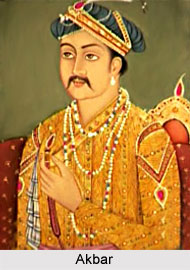 Religious policy of Akbar was that of complete toleration. His policy was based on the principle of universal peace. Akbar was the first among the emperors of Delhi who pursued such a policy. It was Akbar, who, from the very beginning of his reign, gradually accepted a policy of dynamic toleration and active sympathy for religious and spiritual movements. Various factors were responsible for the liberal views and policies of religious toleration of Akbar. His father was a Sunni while his mother and his protector, Bairam Khan was Shias. His tutor, Abdul Latif had so much liberal religious views that he was regarded a Sunni in Persia and a Shia in northern India. Therefore, Akbar grew up in liberal surroundings which affected his personal views.
Religious policy of Akbar was that of complete toleration. His policy was based on the principle of universal peace. Akbar was the first among the emperors of Delhi who pursued such a policy. It was Akbar, who, from the very beginning of his reign, gradually accepted a policy of dynamic toleration and active sympathy for religious and spiritual movements. Various factors were responsible for the liberal views and policies of religious toleration of Akbar. His father was a Sunni while his mother and his protector, Bairam Khan was Shias. His tutor, Abdul Latif had so much liberal religious views that he was regarded a Sunni in Persia and a Shia in northern India. Therefore, Akbar grew up in liberal surroundings which affected his personal views.
Akbar was keen to know the truth of religion. He used to remember God, came in contact with saints and went on pilgrimage to Ajmer several times at the mausoleum of Sufi saint Shaikh Muin- ud-din Chishti. He also respected very much Shaikh Salim Chishi of Fatehpur Sikri. In 1575 A.D., he constructed Ibadat Khana, (House of worship) at Fatehpur Sikri in which regular discussion on religion took place. He wanted to ensure religious peace and security to the Empire. His abolition of pilgrimage tax and Jizya, construction of the Ibadat Khana etc. were all done with this purpose. Akbar`s policy of religious toleration was based on his final belief that there is truth in every religion. To put into practice, he formed certain regulations such as people of all faiths i.e. Muslims, Hindus, Christians, and Jains were allowed to construct buildings for purpose of their worship, to propagate their faith peacefully and celebrate their religious fairs and festivals; state services were open to people of all faith; uniform taxation system was applied to all citizens and no social distinction was to be observed among the people on the basis of differences of their religion.
Akbar personally observed certain practices. He started the practice of Jharokha Darshan and Tula Dan and celebrated all festivals of the Hindus and the Muslims alike at the court. He stopped eating beef, reduced non-vegetarian diet, kept fire burning in his palace for twenty-four hours, stopped going on hunting and tried to stop unnecessary killing of birds. Akbar provided equal protection to all religions and the made no distinction between his subjects in any field on the basis of religion.






































